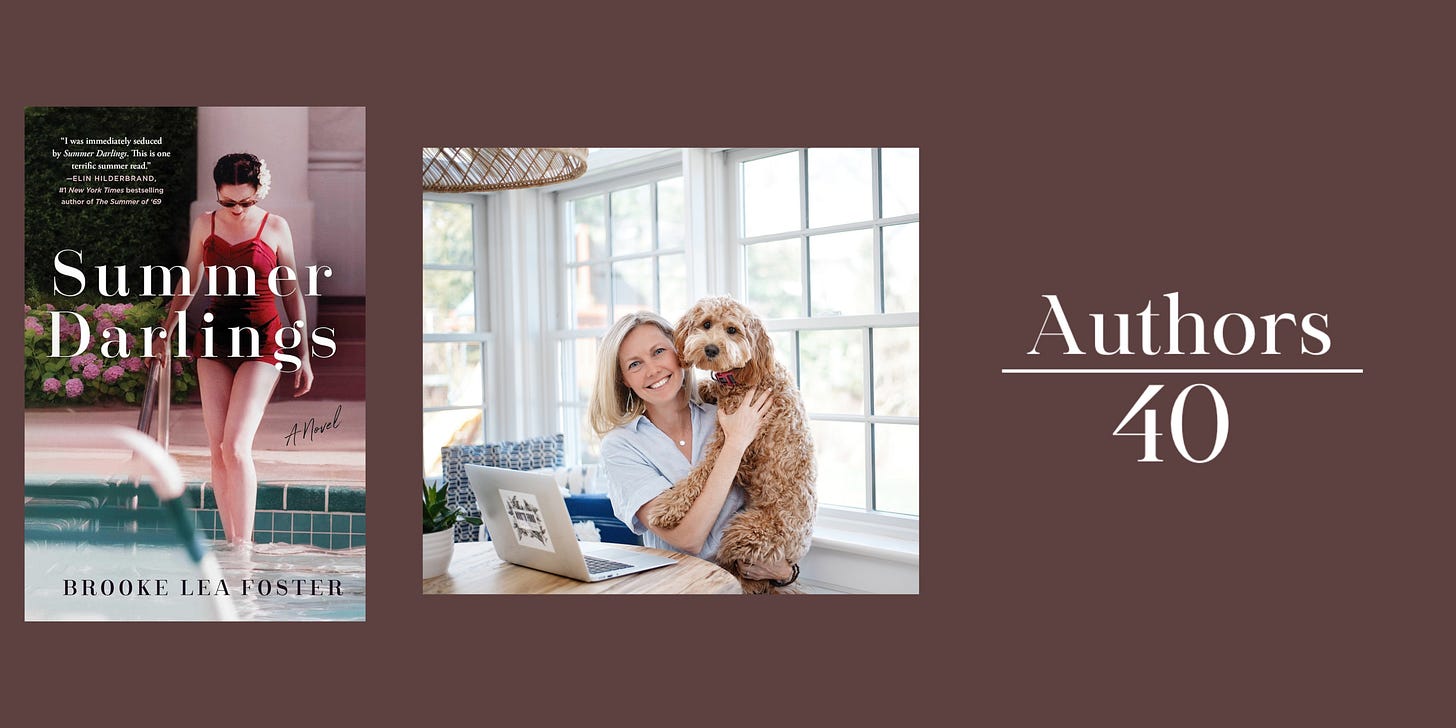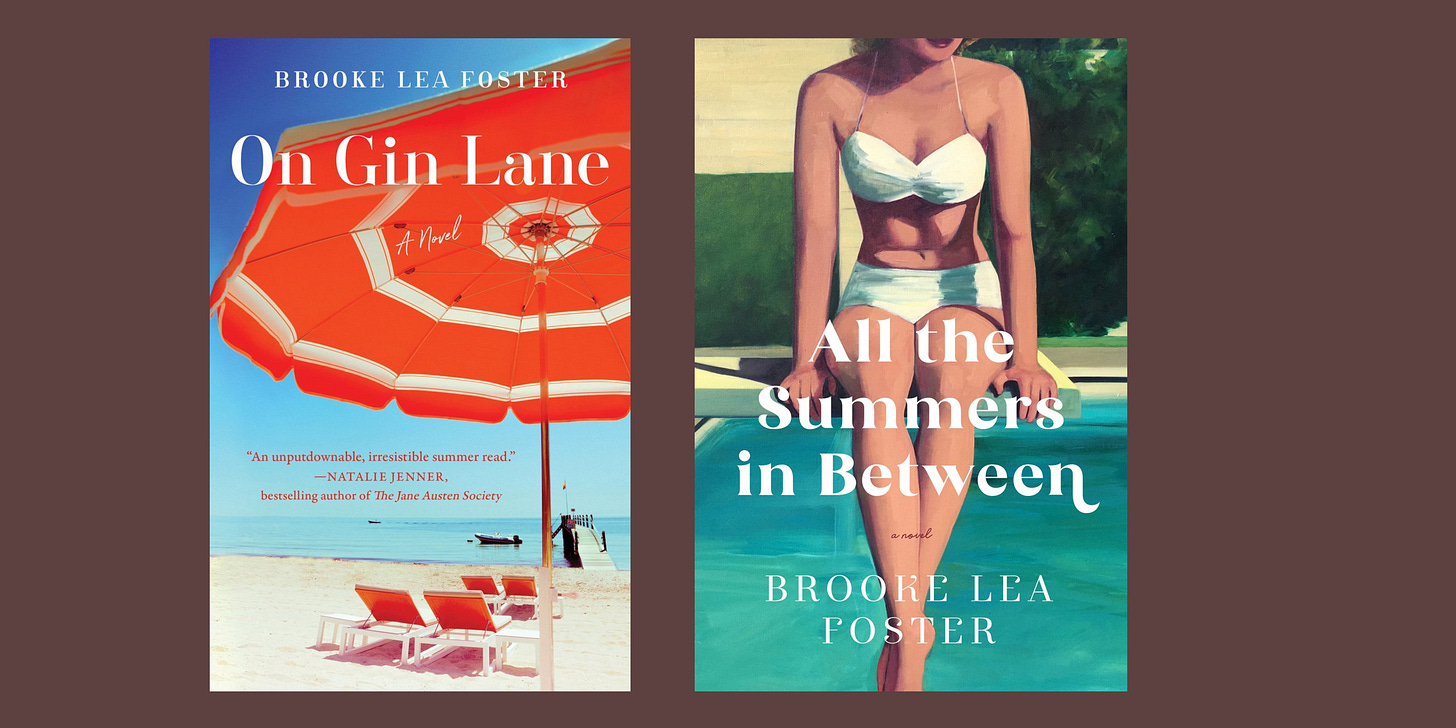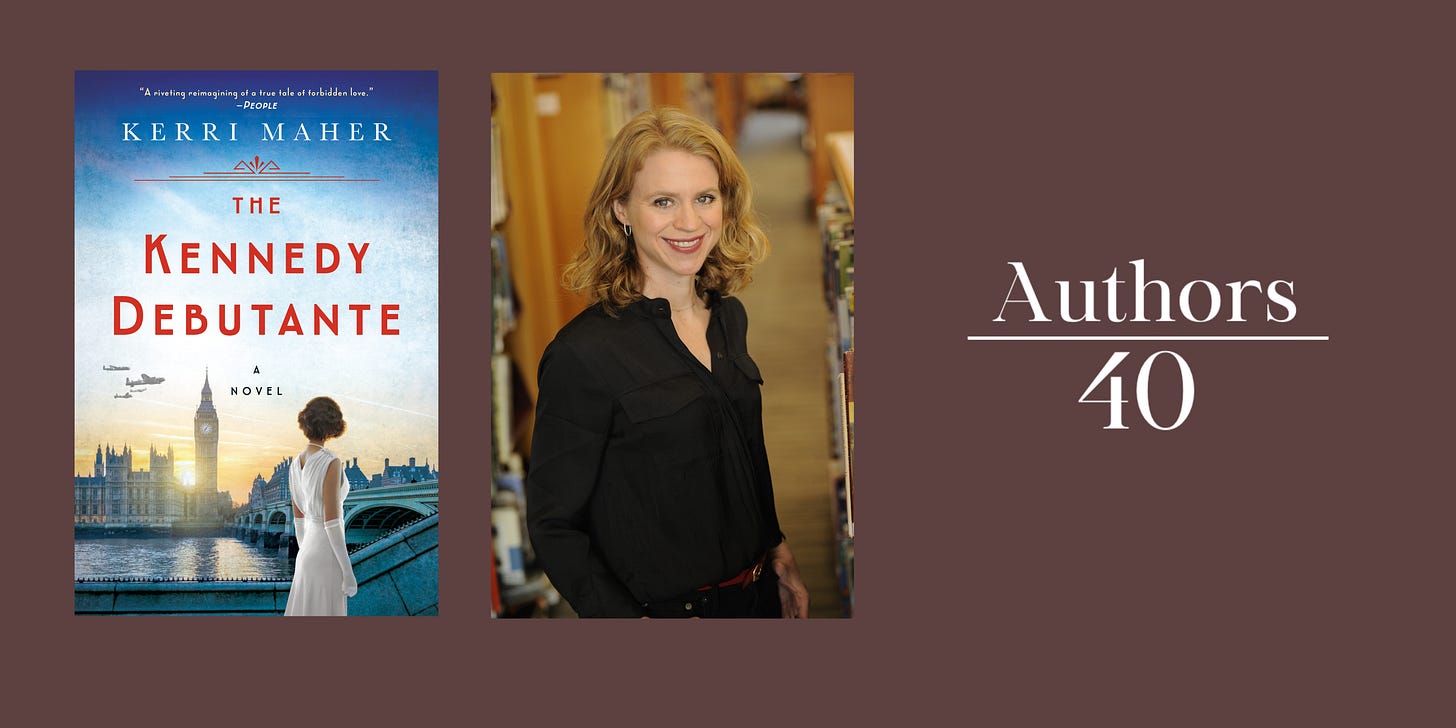"If a story isn’t working, you fix it and try again."
Brooke Lea Foster on applying journalistic grit and thinking to the novel life.
VITAL STATS:
Your age when your first novel published, and the title of that novel: My first novel was called Summer Darlings, and I was 44!
Your age now: 48.
How many novels you published to date: Three novels. In addition to Summer Darlings, my novel On Gin Lane released in May 2022. My third novel All the Summers in Between comes out in June 2024.
What’s your next novel and its pub date if you have it: See above! It’s June 4, 2024
INTERVIEW
1. How many novels did you complete before the one that became your first published novel?
I began writing my first novel when my second baby was born, and I think I was so overwhelmed with having two young kids that novel writing was a great escape. At the time I was still working as a paid journalist, the job I’d been doing since I was 22, and finding time to do anything for myself was challenging. I’d always dreamed of writing novels, but I felt like it was something smart, literary people did. I was intimidated. But after my little girl was six months old, I had this idea: What if I wrote a historical fiction novel set at the beach? I’d read so many historical novels set in World War II, but what if my books were about summer wives in beach towns? Add the dramatic plot, of course. Think: Elin Hilderbrand meets Kristin Hannah.
While on vacation in Martha’s Vineyard that same summer, I had an idea, and the characters began to form. I told my husband that if I didn’t try to write this book, I would always regret it and he encouraged me to give it a try. I gave myself six months leave from my paid journalism work to attempt to write a viable draft. Then I enrolled in fiction writing classes at a nearby liberal arts college, since I knew I needed help. I’ll never forget the day we workshopped my very first draft. I knew it was rough – I was used to writing messy first drafts in my journalism work – but when it was time to critique the manuscript, my fellow classmates kept their eyes down. They didn’t want to admit how bad it was.
“I’m used to being editing, it’s okay,” I told them, urging them to be honest. My goodness, it was a brutal workshop, but it illuminated the biggest problem with my novel: What was I trying to say? I realized then that I didn’t know, so I went back to the book and worked on it for two more years before I sent it to agents.
2. What kinds of jobs did you have to support yourself while you wrote? Are you still doing one of them?
I’ve always been a journalist, and it’s very easy for me to juggle paid writing work and fiction work now that I’ve been working as a novelist for four years. What’s not easy is finding time. I have two kids who expect me to transition to full-time mom at 3pm. I must be very efficient with my time. No goofing off on social media. No long lunches with friends. I mean, I do these things like everyone else, but I also set strict rules for myself when my kids are at school so I can get my writing done.
I think if I didn’t create a strict schedule, I probably wouldn’t have been able to write three books in four years. I’m including my fourth novel, which I’m finishing right now.
3. What was the writing routine in which you wrote the novel that became your first published? How long did it take to write that book?
When I was writing my next two novels, I knew what my schedule needed to look like to get things done. Here’s how my days unfold: As soon as I drop my youngest child at school and after I walk the dog, I spend thirty minutes working out to manage my anxiety and feel good. After that I immediately sit down to write. I write from about 9:30am to noon. Then I take a quick break for lunch, often peanut butter and jelly on wheat bread. From 12:30/1pm to 3, I write again. If I’m feeling particularly inspired, I might sneak off to my third-floor office after the kids go to bed.
I go through phases with writing. Sometimes I have so much I’m trying to get down before inspiration fizzles out. Other times it’s slow going. But I always show up at my desk no matter what and make progress, even if it’s incremental.
4. What was your darkest moment before selling your first novel?
One might say the first time it was workshopped, which I mentioned above. But I think the hardest moment was when I was querying agents. When I thought my manuscript was ready, I sent out queries to twelve agents and ten asked to read my full manuscript. I think agents were more inclined to respond to me because I had a journalism background with lots of writing experience. I thought to myself: Wow, this is easy. Why does everyone think it’s so hard to get a book published?
Ahem. I was in for a big disappointment.
It took months for each agent to read it, and ultimately, all of them rejected my work. At first, I was devastated because I had researched the agents of some of my favorite writers. I had to accept that I wasn’t as good as those authors, and I may never be. I sulked quite a bit.
Then I remember waking up one morning and falling into the same mindset I had as a journalist: If a story isn’t working, you fix it and try again.
After those ten rejections, I spent another year revising my novel, and it changed so much during that time. I asked my trusted writing instructors for feedback. When the feedback was harsh and critical, I didn’t get angry. I listened closer. It was the only way I could get better, and I knew it. I ended up meeting my agent at one of those publishing conferences where you “speed date” with various agents. As soon as we sat down to chat, we clicked. She loved my pages. She got the book. Suddenly, I had an agent and six months later, a book deal.
5. What advice about writing helps you stick with it?
I’ve seen too many writers, especially fiction writers, resist criticism. I heard Anne Hull, a Pulitzer Prize winning journalist at the Washington Post, once speak at a journalism conference, and she said: “Rewriting is a gift. There are very few jobs where you get a do-over.”
It’s true with writing novels. If someone tells you things aren’t working in your story, listen to them. Now you cannot blindly listen to everyone; some people give terrible advice. But what I’ve found is that most of the time you know deep down that things aren’t working in a story, whether it’s a character or a plot point, but you’re too lazy to change it. Sometimes I think I’ll slip the problem past the editor or reader, and no one will notice. Inevitably, it gets pointed out.
My best advice is: Don’t think about rewriting as a punishment. Think of it as a gift. It’s a chance for you to push the story along, get closer to your characters and write a better book.
Also, get your butt in the chair. Many aspiring writers have trouble finding the time to write, and I get that. Not everyone can parlay writing books into a full-time job. But everyone can steal a little time, even if it’s 15 minutes on your lunch break every day. If you keep your head in the story, the story will end up unraveling on paper faster than it would if you put off writing day after day.
6. What is your favorite part about the writing life?
As a journalist, I spent many years writing about other people. I loved interviewing myriad personalities for articles, talking with everyone from the famed newspaperman Ben Bradlee to a pro basketball star to a kid genius. But writing fiction is different. Dare I say, it’s magical. I don’t need to get a great quote or tell the story of someone’s life. I get to make everything up, and in some ways, it’s just like playing make believe like you did as a child.
I parachute into various characters heads and lives and dramas and I get to make sense of them. I love taking women’s stories from the 1950s and 1960s and turning them into powerful narratives that inspire readers. I love taking readers on a journey back in time to show them all the things that have changed and haven’t changed at all.
I also love the chocolate chips. I tend to nibble on a lot of them as I’m writing, and I think it’s my happy place. Typing away in my third-floor office, writing dialogue, living in some awesome beach town in my pages and eating lots and lots of chocolate.
xo
Thank you so much, Brooke! I absolutely love what you say about rewriting being a gift - I couldn’t agree more, and I’d never thought about it quite that way until you quoted Anne Hull and applied it to your own work.







Enjoyed this so much. Love the reframe to thinking of rewriting as a gift. It’s true!
Love this!!! Thank you for featuring my work!